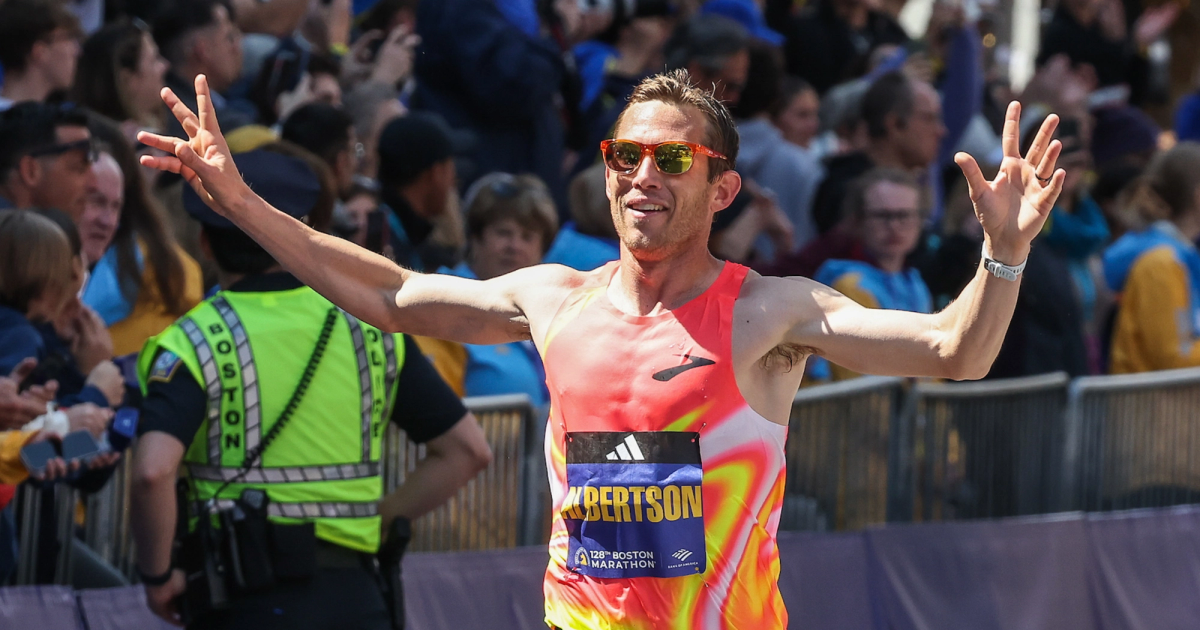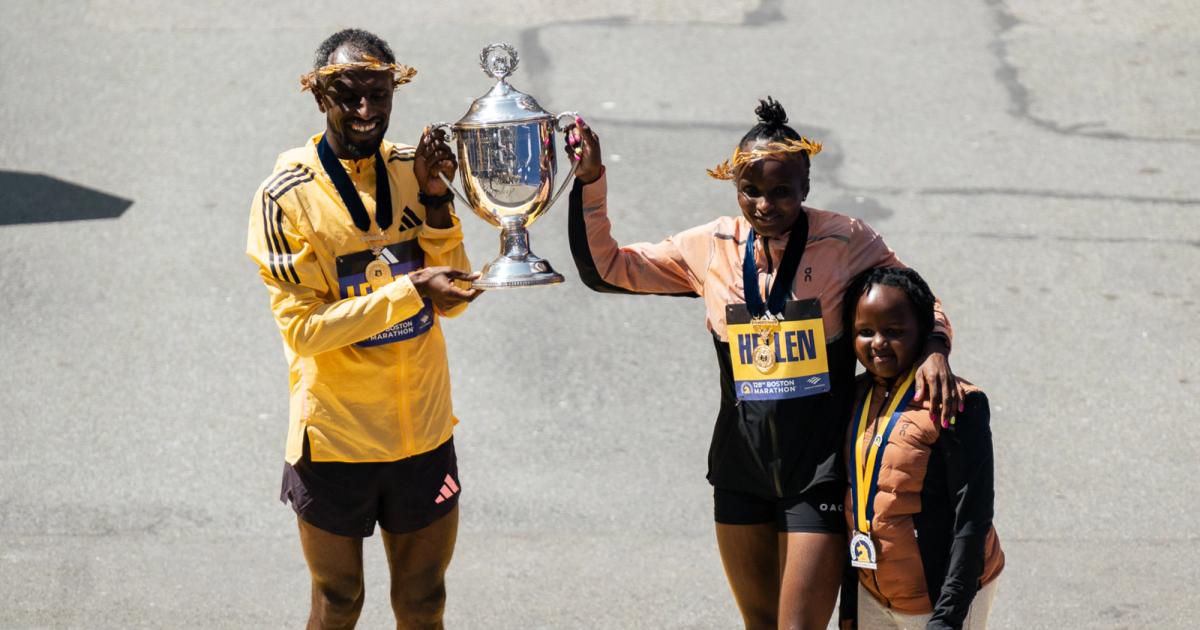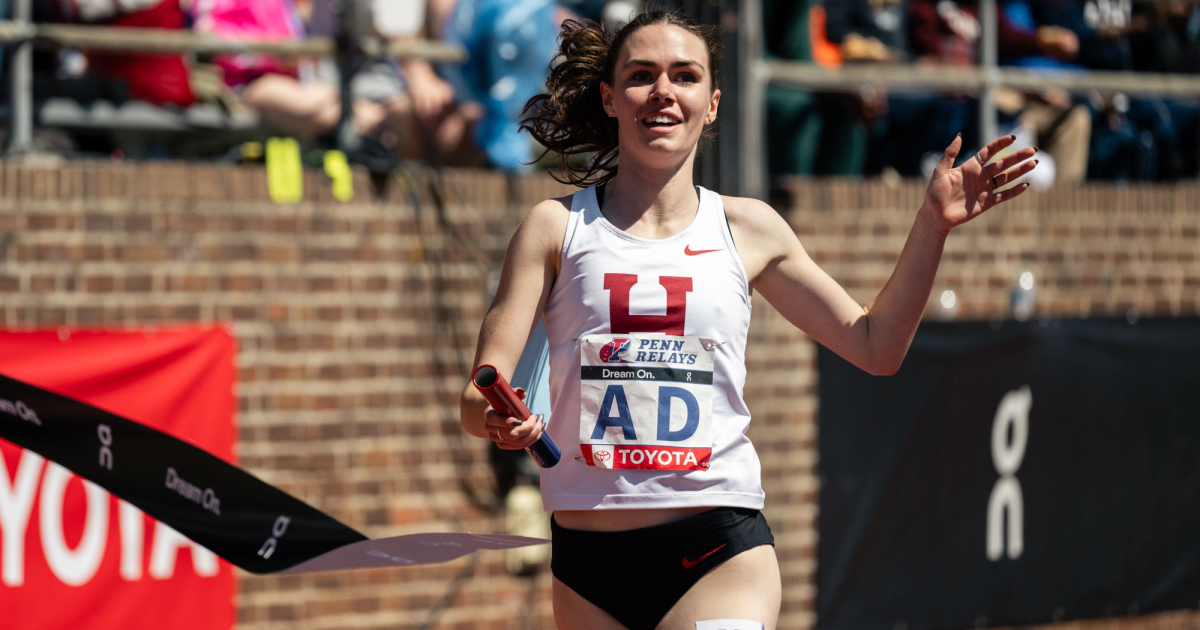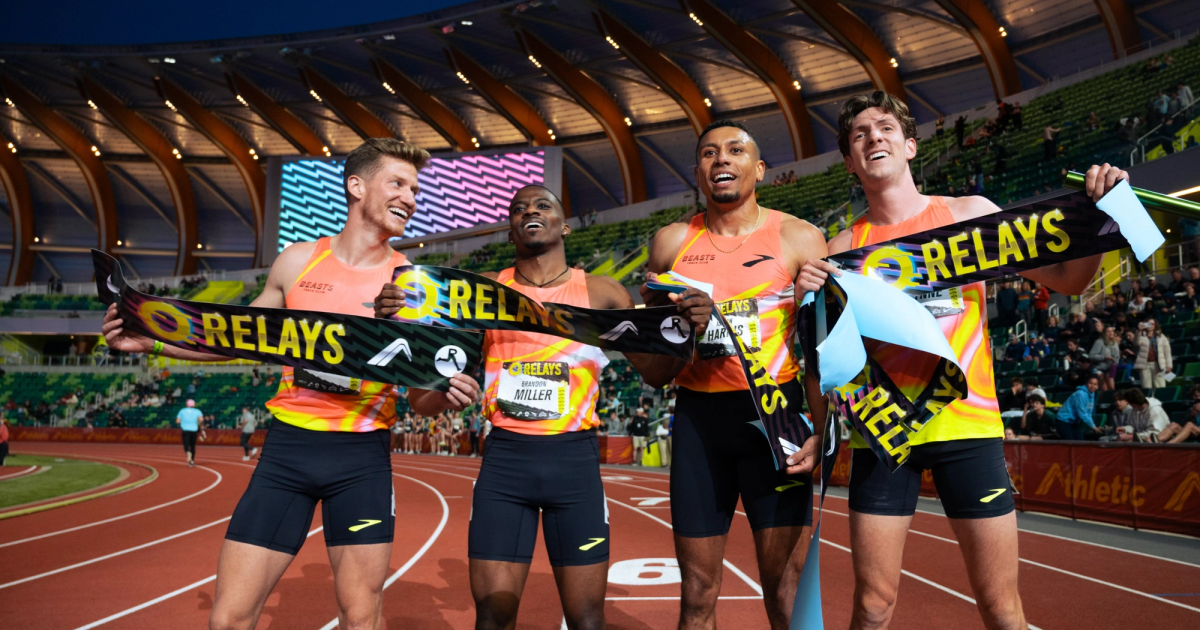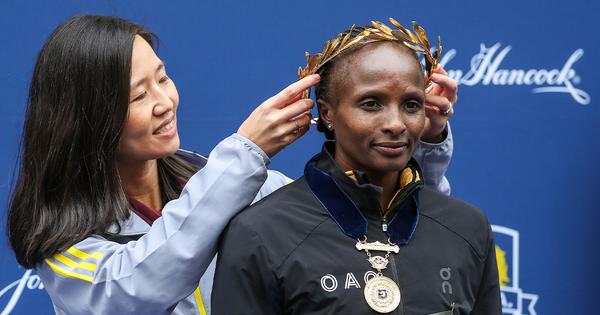By Citius Mag Staff
May 1, 2024
CITIUS MAG’s Eric Jenkins hopped on the phone with freshly minted sub-2:10 marathoner C.J. Albertson after a top-10 finish at the Boston Marathon to talk about his approach to the race, accurately predicting his splits, his unique and surprisingly laid-back approach to training, and why he thinks more marathoners lack consistency. This interview has been lightly edited for length and clarity.
Eric: It's about a week since the Boston Marathon. You’re coming off a fresh PR, 2:09:53, seventh place, top American. You’ve had a little bit of time to digest. How are you feeling about it?
CJ: I feel good. I mean, going into it I was going to be happy with a top ten finish. So being seventh, which is my highest finish at Boston, breaking 2:10, which I had never done before, being top American, which I had never done before… I've always thought that I could do those things but haven't actually done them. So to be able to check all those boxes was great, especially after coming off of the Trials ten weeks ago.
Everything feels pretty good and the race went about as good as it could go. I definitely can't complain and definitely feel good about it.
Eric: It was a little bit of a different race for you than last year. Was that kind of the plan coming in? Was it tough to see the lead runners get a little bit of a gap in the lead miles?
CJ: It actually ended up being perfect. I was worried that the front group was going to go out faster than I wanted to and that everyone was going to go and that there wasn't going to be a second group. And then I'd have to run by myself and not really be able to keep racing.
But the front group went out fast enough and hard enough that some good guys stayed back and formed a second group, which was exactly what I wanted. I didn't want to run 62-flat for the first half because I just wasn't wasn't ready to do that. I couldn't do that, and didn't want to. So it was great that we had a good second pack that I could run with for a little while. From the first mile, I was like, ‘okay, this is great – this is exactly how I would have drawn it up if I could.’
Eric: We’ve seen you run from the front before here, so did you enjoy catching the guys that went out too hard?
CJ: It was definitely fun catching people at the end. I mean, I do like running up front and leading is fun, too. But being able to to feel good through the middle of the race was great. Going through the Newton Hills I even passed a couple of guys on the uphill. And that felt good.
But most of the race was fairly uneventful, really. For the first ten miles, I was just kind of in a pack, and then I was running by myself. From miles 10 to 24 I probably passed two people and maybe a guy or two dropped out. So maybe I moved up a little bit more, but I only actually saw two guys on the road.
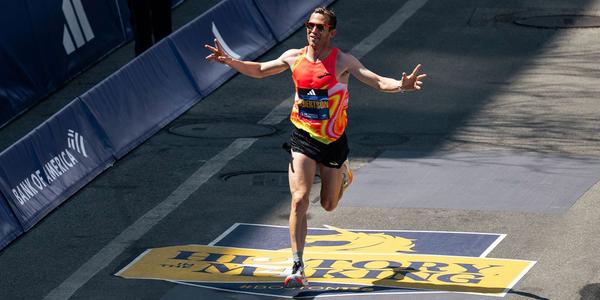
Johnny Zhang/@jzsnapz
Eric: What areas do you think you'd like to improve on if you could run that race again? Would you do it exactly the way you did it? Would you change anything up?
CJ: I think this past Boston was as about as ideal as it could be. Sixth place was about 1:40 ahead of me. So I caught everybody that I could catch. And realistically, I wasn't going to run 2:08:15 or whatever on that day.
I think I can have the fitness to run that, but my fitness as of Monday was not 2:08:10. I measured things out pretty well I think. Even the last couple of miles I was still a little bit conservative. I could see guys up the road that I thought I could catch, and I thought I could go a little bit faster. I thought maybe I could really turn it on and run 4:50 pace or so, but I could tell if I just stayed in my 5:00 spot rhythm, I would catch people.
My calves were kind of seizing up a little bit here and there, so I was just like, ‘you know, I'm just going to run to catch all the people that I can see.’ And I did that. And then actually someone came up on me, which I didn't expect. But then had a lot left in the tank to outkick him. I think I played it as well as I possibly could have.
Eric: Coming off the Trials, where you had a great race, were there takeaways that you were actively trying to put into place in this Boston race?
CJ: Not really. I mean, obviously I was catching people at the end of the Trials, but that kind of happens in every marathon. It just kind of reinforced that, like the last mile or two, there's just always at least a couple people blowing up. So if you can just continue to run solid, even if you can't see anybody at mile 21 or 22, there's more than likely going to be at least a couple people coming back.
So I knew at Boston – especially when I'd been running by myself for for so long – it was like, ‘all right, I can just like stay on this because when we get to mile 25 there's going to be some people blowing up, walking on the side of the trail that I can pass.’ And that's exactly what happened.
Eric: Before the race you had posted mile splits and you finished a couple seconds away from the predicted time. Was that surprising? Are you always that in tune with your body and what you think you're going to run?
CJ: I feel like I'm pretty in tune as far as what I can run in marathons or in races, but they’re all different – just how people go out and how you're reacting. So that post was kind of a joke in a sense because for most of the Boston races I’ve been in, I haven't really gone out at a pace that would be ideal for me, or ran a race that was really ideal for me. But I was also just racing the race that I was in. So it was more just more of a joke.
I think because I've gone out hard before people maybe just thought I was an unintelligent runner – like I get it, I understand what the paces are and I know exactly what my body can do. But also I'm racing. So, that post was just kind of alluding to like, here's the splits I would run like – I know how to pace. I was just poking fun at myself, but, yeah.
But when I did have a group that was actually going those paces, it worked out and I ran. I wasn't surprised because I thought I could do that. It doesn't always go exactly that way, but I've also run 2:10 or 2:11 ten times in a marathon. Which is pretty consistent. I run vastly different splits, but I run pretty consistently every time out.
Eric: In the last 12 months, you’ve run five marathons at a world class level – 2:10-2:11, now 2:09. How do you stay consistent? At this level, we see so many guys have big races, then they'll have a down race. You don't really seem to have that.
CJ: I don't know why people have such a variation in the marathon. I understand sometimes you have things go wrong. You have stomach issues or your legs are more fatigued than you think.
But in my mind, it seems like a race that you should be more consistent in. In a 5000 or 1500, you can go out a little too fast and really bury yourself, or the race can be slow – there are so many different dynamics that can change the overall time of a race. But for a marathon, obviously pacing can change too, but you're always running slower than threshold and never really extending yourself that much. You should always at least be able to settle into a pace that's pretty close to your marathon pace. I don't know. It just seems easy to me. I mean, I've run so many 20-plus mile runs at around 5:10 or 5:15 pace that running at marathon pace is fairly easy. Or it's just like something my body knows how to do. I'm not exactly sure why other people don't have that strength, I guess.
Eric: It's a good strength to have, I'll tell you that! Looking ahead into the fall, you have big goals, so coming off a race like this do you want to implement some new things in training? Or do you just say, ‘you know, I'm on the right path… let's keep doing exactly what I'm doing?’
CJ: I just want to progress with my career and get faster, get better. I think maybe in the past after some good races I'd be really fired up and be about the next thing. But I think the more you go on and the more you race – good or bad – you just move on. I don't mean to sound like it's emotionless but, you really do move on to the next thing. lt's about getting back to business and not getting too high or too low about anything in particular.
I think for this race my training was significantly less than I've done in the past. And it was a little bit different because I trained fairly hard for the Olympic Trials and obviously had good fitness there, but the last ten weeks to Boston weren't spectacular. I felt a little bit more comfortable with my speed. I did some sprinting on the track with spikes that I felt like that helped in different ways. Just a gentle progression of adding speed along with my normal mileage and normal long runs. I think when I can put it all together and then race how I executed in Boston, I can run pretty well.
I think I've been more fit than I was at this year's Boston. But the way I was able to execute that day has me excited for future races where I'm in better fitness. So I think when I have the combination of all the good training and execute the race well, then I can hopefully get into that 2:07-type time I know I'm capable of. But I have to get all the pieces together.
Eric: You obviously train like an animal. But are you going to take some downtime right now? Like, what's your plan for the next coming weeks?
CJ: The majority of the year I'm not in serious training. The ten to 12 weeks before a marathon I'm trying to really buckle down, be pretty serious. And that's really only two times a year – obviously I'll race more than two marathons but I'm really only going through two of the heavy cycles. So for half of the year I'm mentally not in serious training. If you go through my Strava graph for the whole year, you'll notice the majority of the weeks are nothing special, not really high mileage. Sometimes it even looks pretty inconsistent. And mentally it's very laid back, so I really only go after it sparingly and for not that long. That allows me to stay fresh and hopefully will allow me to have some longevity. So the next 12 months, I'll be training and running so my baseline fitness stays pretty high. Even if I don't do a whole lot. You know, I can go on a 20 mile run at 5:20 pace with moderate effort. I can kind of do that type of stuff.
So yeah, hopefully the next couple months will just be kind of whatever. I'll feel it out and as of right now I don't have a set schedule for races yet – and then whatever fall marathon I pick, as it gets closer to that, then it'll be more focused and a little bit more structured.
Eric: In a sport that can be kind of cookie cutter, monotonous… people do things the same, you're not in a big group, you’re self-coached, doing it on your own. Do you draw motivation from that? Does that kind of fire you up to be different than everybody?
CJ: I don't know if that really gives me specific motivation or fuel. I just kind of do what I do. I'm confident enough in myself that I know how to get where I want to be. It's not like I've only had one or two solid races in my career. Both times at the Trials I had good results – in 2020 I was 7th, this year I was 5th, and those go on top of Boston and my other races. So I think it gives me confidence that the way I race is working and the training doesn't always have to be perfect.
I'm never in the mindset that I have to hit an exact workout in order to be race ready. I can race well regardless of all that. And in the long term, I've done enough – I've done enough work as an athlete. From the past 20 years of running, I believe I should be able to put it together on race day on a regular basis. It really does take a lot of the pressure off.
I always go back to college – especially when I was struggling and my training was so stressful and every workout had to go well or else my confidence would be shot. I put so much weight on every workout, every race. And my training now is just kind of what it is. There's not a lot of weight put on it. And it just feels a lot lighter.
Eric: You know, you're quickly becoming an athlete that people like to root for. But who are the athletes that you root for? You know, pre-race, you're getting psyched up… like, what's a race you're tossing on to to watch and get some motivation from?
CJ: I watch a lot of track. I watch a whole lot of races. Because I'm a Brooks guy it's been really fun to root for Josh Kerr and see him have a lot of success. And then you have all the 1500 banter that's been going back and forth, it's just a lot of fun in general. When I was in college, I just remember him having this crazy kick from 600 meters out. I've been a fan since then. But other than Josh, we really watch a ton of track at the house once the track season begins. It's always on. There's something super exciting about track that I love.

Citius Mag Staff
